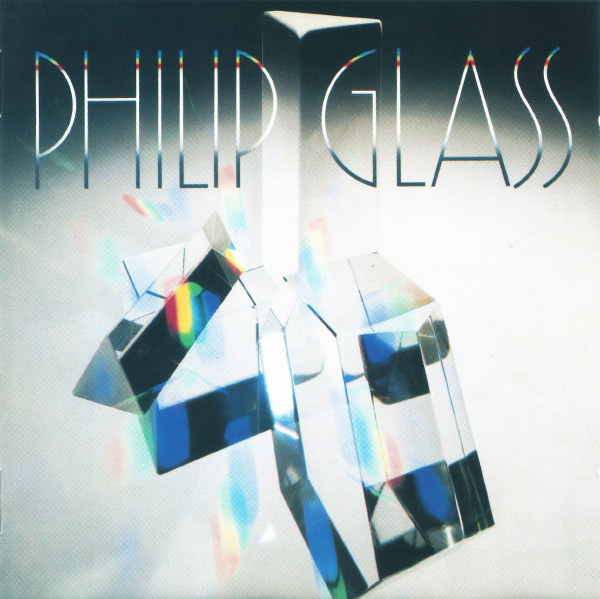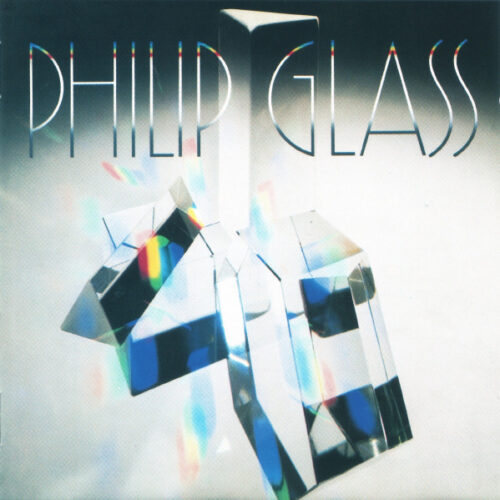On January 31, 2012, American composer Philip Glass celebrated his 75th birthday. His constantly evolving legacy is his music, which helped form the school of classical music we now know as minimalism, though he has since attempted to separate himself from that label. His legacy is also his prolific tenacity, his ability to merge high and low culture through Academy Award-nominated film scores, solo piano works, collaborations with other musicians, string quartets, and operas. His name and style are known so well by the mainstream western world that he was lampooned on South Park as an animated Philip Glass proceeded to sit at a piano, playing the same note over and over again. His legacy is also his omnipresence and versatility — few collaborations have moved me as much as the one he performed with Patti Smith at Allen Ginsberg’s memorial ceremony.
Among Glass’s accolades is the album Glassworks, released in 1982 on CBS Records. Celebrating its 30th anniversary this year, this album was and is a lot of things for Philip Glass, and for music in general. It was supposed to be the record that finally married pop and classical, the record that housewives spun as they prepared dinner, the latest hits that people chatted about at work. As I was busy being born that year, I can’t say with certainty how much the people talked however.
But I can say how much they listened. Artists who have worked with Glass — Aphex Twin, Brian Eno, Portishead — have clearly internalized the music of Glassworks, ascertaining the album’s rhythms and fluctuation between stripped-down pieces, synthesizer-heavy tracks, and ensemble work. And Glassworks is still Glass’s best-selling record to date, despite all the accolades that have crowned his other work.
Part of Glassworks‘ appeal is its simplicity. In a world of twelve-tone music and microtones and serialism, Glassworks, to a lot of people, was finally just music. Containing only six tracks, no song on the record exceeds ‘Islands” seven minutes and forty seconds. And consider the stunning simplicity of the first track, ‘Opening’.
The beautiful arpeggios repeat without much variation. At 6:25, it’s just enough to put the listener into a small trance. Allmusic.com’s John Young compares ‘Opening’ to the work of Erik Satie, but played with smaller intervals between the notes. While the ghost of Satie’s solo piano work does oversee ‘Opening’, there is a marked difference between the two composers. Whereas Satie’s Gnossiennes are meandering, melancholic pieces, ‘Opening’ rolls gently but with purpose to its melodic destination.
Says the composer in Music by Philip Glass, "The Glassworks record begins with a solo piano piece, ‘Opening’, written for Michael Reisman, that was meant to create an intimate atmosphere from the very start." Returning to Young’s acute review of the record: "Glassworks is tuneful in the most pleasingly direct sense – the arrangements define the melodies so cleanly they’re instantly memorable. In addition, the album is programmed with a particular shape in mind. It’s kind of a waveform, where every other relaxed melody is upset by a classic Glass rush – ‘Floe’ is even outpaced by ‘Rubric”s honking saxophones and enough cascading counterpoint to give David Helfgoff a case of carpal tunnel syndrome. These two tunes are so disruptive, so complex, that it’s easy to think that they dominate the whole project. But they’re also the shortest tunes on the album.
Indeed, ‘Floe’ and ‘Rubic’ are jarring to most listeners. The steady French horn that introduces ‘Floe’ quickly becomes a cacophony of synthesizers — a harsh aural change from the sweetness of ‘Opening’.
Adam Downer of Sputnik Music writes: "’Floe’ is one of two chaotic movements in Glassworks, with the other, ‘Rubric’, being the one minor stumble in an otherwise smooth record. ‘Floe’ transitions out of ‘Opening’ with horns before exploding into arpeggiated synth lines and later throwing all the themes he builds in the piece together in a bombastic apex. Overall, ‘Floe”s indicative of the greatest aspects of Glassworks: with naught but strings, horns and lots of synths, Glass creates quite the track, which translates into a nearly equal sextet of music."
Yet, due to the difference between Glassworks and the rest of Glass’s canon, the New York Times referred to the album as a "footnote in Glass’s catalog". In this article, which centers on Brad Lubman’s revival of the record, Allan Kozinn glosses over Glassworks as a marketing ploy by CBS to introduce Glass to their listening audience, not as an apex of his work.
And, in many ways, Kozinn is right. Glassworks lacks the immediate, epic drama of Glass’s opening to the score for Mishima, A Life in Four Chapters. It lacks the narrative meat and confluence of form and content that inform Glass’s so-called Portrait Trilogy three operas comprised of Einstein On The Beach, Satyagraha and Akhnaten, which celebrate Einstein, Gandhi, and the pharaoh Akhenaten, respectively. It lacks the emotional suspense of the score for The Hours or Glass’s Violin Concertos. And it certainly is not a technical polyglot of the same caliber as Symphony No. 8.
But that’s the thing. Glassworks was never meant to be any of those things. It’s not a symphony or an opera or even a film score — it carries a different agenda. Glass and his collaborators were aware of it from the start. In fact, they even made a special mix of the record to be listened to on a Walkman:
"Kurt [Munkacsi] introduced another innovation which, in retrospect, seems more like a novelty, but was very interesting at the time. He made a special ‘Walkman’ mix of Glassworks, intended to be heard on small, portable cassette players. This was no gimmick but a truly different mix made with headphones plugged directly into the mixing board." [from Music by Philip Glass,]
While the days of Walkman music are over, Glassworks lives on, not as Glass’s crowning achievement, but as one among many worthy of celebration. In fact, Glassworks is quite likely one reason that Glass’s name recognition is so much greater than that of his contemporaries, such as Steve Reich or John (Coolidge) Adams. Even those who only know of Glass’s film scores probably know his work better than that of Clint Mansell or Michael Nyman, two composers who’ve largely built their careers on scoring films. Now that 30 years have passed since the release of Glassworks, hopefully listeners have finally put away their Walkmen and indulged in the breadth of Glass’s back catalogue.



